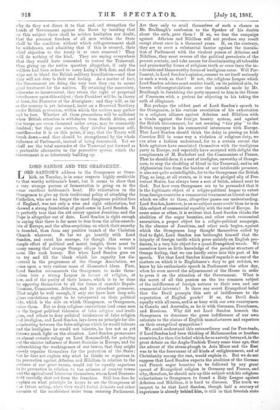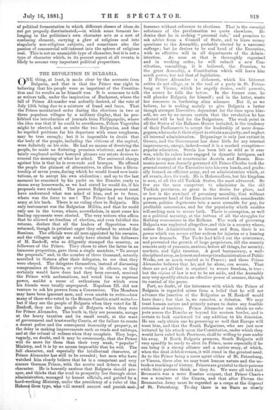LORD SANDON AND THE ORANGEMEN. T ORD SANDON'S address to the
Orangemen at Orms j - kirk, on Tuesday, is in some respects highly creditable to that worthy nobleman's heart, but it seems to show that a very strange process of fermentation is going on in the same excellent nobleman's head. His exhortation to the Orangemen to give up their traditional policy of attacking the Catholics who are no longer the most dangerous political foes -of England, was not only a wise and right exhortation, but showed a strong foundation of good-sense in Lord Sandon. It is perfectly true that the old outcry against Jesuitism and the Pope is altogether out of date. Lord Sandon is right enough in saying that there is far more to fear from the ultra-anarch- ists of Europe, and the ultra-scepticism on which their anarchy is founded, than from any positive branch of the Christian Church whatever. So far we go heartily with Lord Sandon, and extol his courage, for though this seems a simple effort of political and moral insight, there must be many among that strange Orange clique to whom it would seem like rank heresy. But when Lord Sandon goes on to try and fill the blank which his sagacity has dis- covered in the programme of the Orange Association, we come upon a very curious mass of ill-assorted ideas. First, Lord Sandon recommends the Orangemen to make them- selves into a strong League in favour of religion, of law, and of the purity of their homes, which is to be done by opposing themselves to all the forms of anarchic Repub- licanism, Communism, Atheism, and its attendant grossness. That might be well enough, if only one knew how deep reli- gious convictions ought to be interpreted on their political eide, which is the side on which Orangemen, as Orangemen, value them. But as deep religious convictions lead some men -to the largest political tolerance of false religion and irreli- gion, and others to fiery political intolerance of false religion and irreligion, and Lord Sandon lays down no principle for dis- criminating between the false religions which he would tolerate and the irreligions he would not tolerate, he has not as yet thrown much light on the situation. Lord Sandon pronounces an almost ecstatic eulogy on Lord Beaconsfield, for pointing out the sinister influence of Secret Societies in Europe, and for enfranchising the working-men of our towns, that they might openly, organise themselves for the protection of the State ; but he does not explain why what he thinks so sagacious in its precaution against Atheism and Nihilism in relation to the artisans of our great towns, would not be equally sagacious in its precaution in relation to the artisans of country towns and the agricultural labourers themselves, whom Lord Beacons- field 'carefully shut out from the franchise. Still less does he explain- on what principle he hopes to see the Orangemen of the future acting, when they would forbid Atheists and other enemies of the established order from entering Parliament. Are they only to avail themselves of such a chance as Mr. Bradlaugh's confession to the Speaker of his doubts about the oath, gave them ? If so, we fear the campaign against Atheism and Nihilism will not produce any result except about once in a thousand years. If, on the contrary, they are to erect a substantial barrier against the inocula- tion of Parliament with the virulent poison of Atheism and Nihilism, they must reverse all the political precedents of the present century, and take means for discriminating all tolerable and praiseworthy forms of religious truth or error from the in- tolerable and blameworthy forms of irreligious error. Will Par- . liament, in Lord Sandon's opinion, consent to set itself seriously to such a work as that ? If not, the religious League which Lord Sandon advises must restrict itself, on its political side to barren self-congratulations over the mistake made by Mr. Bradlaugh in furnishing the party opposed to him in the House of Commons with a pretext for objecting to his taking the oath of allegiance.
But perhaps the oddest part of Lord Sandon's speech to the Orangemen, is his curious association of his exhortation to a religious alliance against Atheism and Nihilism with a tirade against the foretn bounty system, and against the British Government, for not securing "fair play" to the British taxpayer in his commercial intercourse with Europe. That Lord San don should think the delay in passing an Irish Coercion Bill in some way a violation of religious duty, we can after a fashion understand, for to a certain extent the Irish agitators have associated themselves with the irreligious party in Europe, and especially have accepted with delight the compliments of M. Rochefort and the Communists of France. That he should deem it a sort of irreligion, unworthy of Orange- men, to stop the shedding of blood in the Transvaal, and to set Afghanistan free from the burden of our intolerable presence, is also not quite unintelligible, for to the Orangeman the British Flag, so long, at all events, as it was the pledged ally of Pro- testant States, has always been a sort of fetish, adored next to God. But how even Orangemen are to be persuaded that it is the legitimate object of a religio-political league to extort from foreign countries a commercial treatment as liberal as that which we offer to them, altogether passes our understanding. Lord Sandon, however, is on no subject more excite than he is on this subject of commercial equality with the rest of Europe. In some sense or other, it is evident that Lord Sandon thinks the abolition of the sugar bounties, and other such economical enormities, a proper object for a religio-political campaign. In the absence of Jesuitism, and other such bogies, against which the Orangemen long thought themselves called by God to fight, Lord Sandon has bethought himself that the iniquity of foreign tariffs which press unfairly on English pro- ducers, is a very fair object for a quasi-Evangelical wrath. We ourselves have so little knowledge of the peculiar structure of Orange feeling, that we can hardly enter into this part of his speech. Yet that Lord Sandon himself regards it as one of the matters on which it is Englishmen's duty to get red-hot, we know by his enthusiastic speech in Parliament the other day, when he even moved the adjournment of the House in order to press it on the attention of the Government. What is the secret of all this passion on the too common subject of the indifference of foreign nations to their own and our commercial interests? Is there any secret Evangelical belief that the Devil prompts this sort of indifference to the exportation of English goods? If so, the Devil deals equally with all races, and is as busy with our own countrymen in Canada and Australia, as he is with Germans, Frenchmen, and Russians. Why did not Lord Sandon beseech the Orangemen to denounce the gross indifference of our own colonists to the claims of English manufacturers and exporters on their evangelical sympathies ?
We could understand this extraordinary zeal for Free-trade, if Lord Sandon had been thinking of Mahommedan or heathen countries, for then the belief which he so naïvely betrayed, in the great debate on the Anglo-Turkish Treaty some time ago, that the advent of the steam-plough in Asia Minor and the East was to be the forerunner of all kinds of enlightenment, and of Christianity among the rest, would explain it. But we do not suppose that Lord Bandon expects the abolition of the German and French sugar bounties to be followed by any great spread of Evangelical religion in Germany and France, and why, therefore, he should mix up this subject with his religious exhortations to Orangemen to found a Holy League against Atheism and Nihilism, it is hard to discover. The truth we suspect to be that Lord Sandon, though half a century of experience is already behind him, is still in that feverish state
of political fermentation in which different classes of ideas do not get properly discriminated,—in which some ferment be- longing to the politician's own character acts as a sort of confusing element, carrying a glow of religions zeal into singularly non-religious subjects, and sometimes also the passion of commercial self-interest into the sphere of religious zeal. This is not an unamiable type of character, but it is not a type of character which, in its present aspect at all events, is likely to assume very important political proportions.



































 Previous page
Previous page